Gardeners Virginia Water: Your Comprehensive Guide to a Thriving Garden
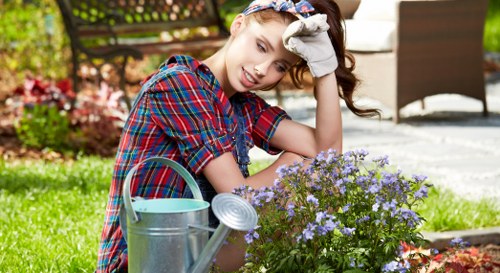
Welcome to the ultimate guide for Gardeners in Virginia Water. Whether you're a seasoned gardener or just starting out, this article is designed to help you cultivate a beautiful and sustainable garden in the picturesque surroundings of Virginia Water. We'll cover everything from soil preparation and plant selection to maintenance tips and local resources.
Virginia Water offers a unique climate and soil conditions that are ideal for a variety of plants. Understanding the local environment is crucial for any gardening success. This guide will provide you with the knowledge needed to make informed decisions and achieve a garden that thrives year-round.
In addition to practical gardening tips, we'll explore the best practices for organic gardening, pest control, and sustainable methods to ensure your garden remains healthy and environmentally friendly.
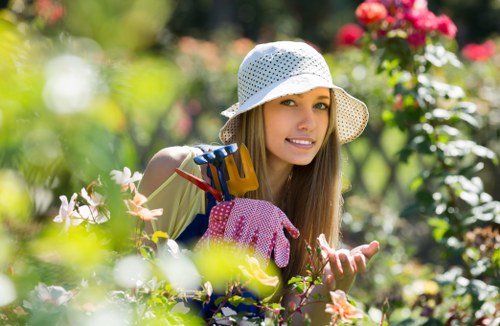
Understanding Virginia Water's Climate
The climate in Virginia Water is classified as temperate maritime, which means mild winters and cool summers. This type of climate is perfect for a wide range of plants, from native species to exotic varieties. Gardeners should take advantage of the moderate temperatures and ample rainfall to create a diverse and resilient garden.
Key Climate Features:
- Mild winters with occasional frost
- Cool summers with moderate temperatures
- Consistent rainfall throughout the year
- High humidity levels
Understanding these climate features will help you select plants that are well-suited to Virginia Water's environment, ensuring they thrive with minimal maintenance.
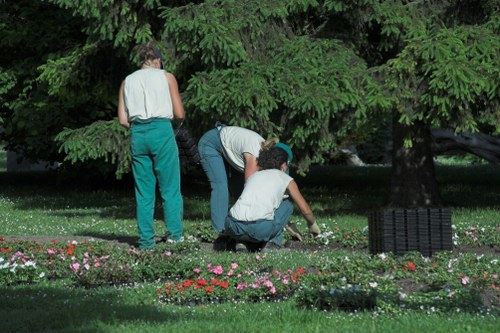
Soil Preparation for a Healthy Garden
Healthy soil is the foundation of any successful garden. In Virginia Water, the soil tends to be rich in organic matter, but it's essential to test and amend it as needed to provide the best conditions for your plants.
Start by conducting a soil test to determine its pH and nutrient levels. Most plants prefer a slightly acidic to neutral pH (6.0-7.0). Based on the test results, you can add lime to raise the pH or sulfur to lower it.
Soil Amendment Tips:
- Add compost to improve soil structure and fertility
- Incorporate well-aged manure for additional nutrients
- Use mulch to retain moisture and suppress weeds
- Ensure proper drainage to prevent root diseases
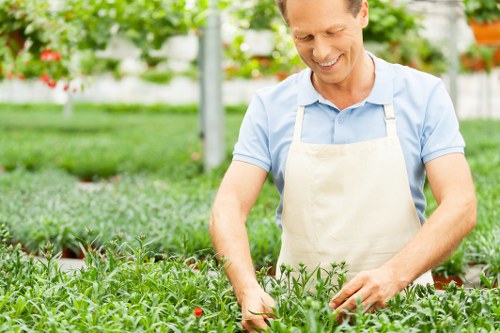
Choosing the Right Plants
Selecting the right plants is crucial for a thriving garden in Virginia Water. Consider both native and adaptable non-native species that can handle the local climate and soil conditions.
Some popular choices include:
- Rhododendrons – Perfect for the shade and acidic soil
- Hydrangeas – Thrive in the moist conditions
- Lavender – Adds fragrance and attracts pollinators
- Japanese Maples – Offer stunning foliage and are well-suited to the climate
Additionally, incorporating a mix of perennials, annuals, shrubs, and trees will provide year-round interest and a balanced ecosystem.
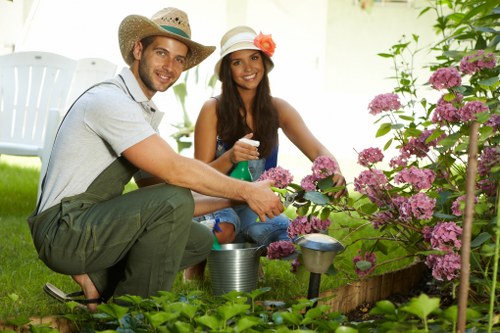
Maintenance Tips for Virginia Water Gardens
Regular maintenance is essential to keep your garden in top shape. Here are some key maintenance tasks to consider:
- Watering: Water deeply and less frequently to encourage deep root growth.
- Pruning: Trim plants regularly to remove dead or diseased branches and promote healthy growth.
- Weeding: Keep weeds under control to reduce competition for nutrients and water.
- Fertilizing: Apply organic fertilizers to replenish soil nutrients and support plant health.
Implementing these maintenance practices will help ensure your garden remains vibrant and resilient throughout the seasons.

Organic Gardening Practices
Organic gardening is a sustainable approach that avoids synthetic chemicals and promotes natural growth processes. In Virginia Water, adopting organic practices can lead to a healthier garden and environment.
Some effective organic gardening methods include:
- Using compost and natural fertilizers to enrich the soil
- Encouraging beneficial insects like bees and ladybugs to control pests
- Practicing crop rotation to prevent soil depletion and reduce pest buildup
- Implementing companion planting to enhance plant growth and repel unwanted insects
By following these organic practices, you can create a sustainable and eco-friendly garden that thrives naturally.

Pest Control in Virginia Water Gardens
Pests can be a significant challenge for gardeners in Virginia Water. However, with the right strategies, you can manage pest populations effectively without harming your plants.
Here are some natural pest control methods:
- Introduce Predators: Encourage birds, ladybugs, and other beneficial insects to keep pest numbers in check.
- Use Neem Oil: A natural pesticide that targets a variety of pests without harming beneficial insects.
- Set Up Barriers: Use physical barriers like nets or row covers to protect plants from insects and larger pests.
- Maintain Garden Hygiene: Remove dead leaves and debris to eliminate hiding spots for pests.
Implementing these pest control methods will help maintain a healthy and productive garden.

Sustainable Gardening Practices
Sustainability in gardening ensures that your garden remains productive and environmentally friendly for years to come. In Virginia Water, sustainable practices are particularly important given the region's rich biodiversity.
Key sustainable gardening practices include:
- Water Conservation: Use drip irrigation systems and mulch to reduce water usage.
- Composting: Recycle garden waste to create nutrient-rich compost for your plants.
- Native Plants: Planting native species supports local wildlife and requires less maintenance.
- Energy Efficiency: Utilize solar-powered garden lights and tools to minimize energy consumption.
Adopting these sustainable practices will help you create a garden that's both beautiful and eco-friendly.

Local Resources for Virginia Water Gardeners
Virginia Water offers a variety of local resources to support gardeners in maintaining their gardens.
Some valuable resources include:
- Local Nurseries: Provide a wide selection of plants adapted to the Virginia Water climate.
- Gardening Clubs: Offer networking opportunities, workshops, and advice from experienced gardeners.
- Community Gardens: Allow you to share resources and gain insights from fellow gardeners.
- Extension Services: Provide expert guidance on soil testing, pest control, and plant health.
Utilizing these local resources can enhance your gardening experience and lead to a more successful and enjoyable garden.

Closest Areas to Virginia Water for Gardeners
Virginia Water is surrounded by several beautiful areas that are perfect for gardeners looking to explore and find inspiration.
- West Byfleet: Known for its vibrant community gardens and local plant nurseries.
- Thorpe: Offers spacious gardens and parks ideal for large-scale gardening projects.
- Bagshot: Features a mix of traditional and modern gardening styles.
- Windlesham: Home to numerous botanical gardens and greenhouses.
- Longcross: Provides access to organic farming resources and sustainable gardening workshops.
- Sunbury-on-Thames: Known for its riverside gardens and diverse plant species.
- Old Windsor: Offers historical gardens and heritage plant varieties.
- Virginia Water Lake: Perfect for water gardening and aquatic plant enthusiasts.
- Heathrow: Features urban gardening initiatives and rooftop gardens.
- Chertsey: Known for its community-supported agriculture and local produce markets.
Each of these areas provides unique opportunities and resources for gardeners, making Virginia Water a hub for gardening enthusiasts.

Seasonal Gardening Tips
Gardening in Virginia Water requires adapting to the changing seasons to ensure year-round growth and beauty.
Spring
Spring is the perfect time to plant new flowers and vegetables. Focus on preparing your soil, planting hardy annuals, and starting seeds indoors for a head start.
Summer
Maintain your garden by watering regularly, weeding, and providing shade for sensitive plants. This is also the time to harvest ripe produce.
Autumn
Prepare your garden for winter by clearing out dead plants, mulching, and planting perennials that will thrive in the cooler months.
Winter
While gardening activity slows, you can plan for the next growing season, prune trees and shrubs, and protect sensitive plants from frost.

Tools Every Virginia Water Gardener Needs
Having the right tools can make gardening tasks easier and more efficient. Here are some essential tools for gardeners in Virginia Water:
- Hand Trowel: Ideal for planting, digging, and transferring plants.
- Pruning Shears: Essential for trimming and shaping plants.
- Garden Fork: Helps in turning and aerating the soil.
- Watering Can or Hose: Necessary for providing adequate water to your plants.
- Wheelbarrow: Useful for transporting soil, plants, and garden waste.
- Gloves: Protect your hands from thorns, dirt, and potential pests.
- Weeder: Effective for removing unwanted weeds with minimal effort.
- Rake: Helps in leveling soil and gathering leaves.
Investing in quality gardening tools will enhance your gardening experience and productivity.

Creating a Sustainable Garden Ecosystem
A sustainable garden ecosystem supports biodiversity and minimizes environmental impact. In Virginia Water, promoting a balanced ecosystem can lead to a thriving and resilient garden.
To create a sustainable ecosystem, consider the following:
- Diverse Plant Selection: Incorporate a variety of plants to attract different pollinators and beneficial insects.
- Habitat Features: Add birdhouses, insect hotels, and water sources to support wildlife.
- Natural Pest Control: Use companion planting and natural predators to manage pests.
- Composting: Recycle organic waste to enrich the soil and reduce landfill impact.
By fostering a sustainable ecosystem, your garden will be more robust and less reliant on external inputs.

Gardening Events and Workshops in Virginia Water
Participating in local gardening events and workshops can enhance your gardening skills and connect you with the community. Virginia Water hosts various events throughout the year that cater to different gardening interests.
Some notable events include:
- Spring Planting Workshops: Learn about the best plants for spring and how to prepare your garden.
- Organic Gardening Seminars: Gain insights into sustainable and organic gardening practices.
- Garden Tours: Explore beautiful gardens in the area and get inspired by local gardeners.
- Pest Management Clinics: Understand how to manage and prevent common garden pests naturally.
- Harvest Festivals: Celebrate the bounty of your garden and share produce with the community.
Attending these events can provide valuable knowledge and foster a sense of community among Virginia Water gardeners.

Innovative Gardening Techniques
Staying updated with innovative gardening techniques can help you optimize your gardening efforts in Virginia Water. Here are some modern methods to consider:
- Vertical Gardening: Maximize space by growing plants vertically using trellises or wall-mounted systems.
- Hydroponics: Grow plants without soil, using nutrient-rich water solutions.
- Rainwater Harvesting: Collect and use rainwater for irrigation, reducing reliance on municipal water sources.
- Smart Irrigation Systems: Utilize technology to automate and optimize watering schedules.
- Permaculture: Design your garden to mimic natural ecosystems, promoting sustainability and productivity.
Incorporating these innovative techniques can enhance your garden's efficiency and sustainability.

Conclusion
Gardening in Virginia Water offers a rewarding experience, thanks to its favorable climate and rich soil. By understanding the local environment, preparing your soil, selecting the right plants, and maintaining your garden with sustainable practices, you can create a beautiful and thriving garden.
Leverage local resources, participate in community events, and stay informed about innovative gardening techniques to continuously improve your gardening skills. With dedication and the right knowledge, your Virginia Water garden will flourish, providing beauty and joy for years to come.

Frequently Asked Questions
1. What are the best plants for Virginia Water's climate?
Answer: Plants such as rhododendrons, hydrangeas, lavender, and Japanese maples thrive in Virginia Water's temperate maritime climate. These plants are well-suited to the mild winters and cool summers of the area.
2. How can I improve soil fertility in my Virginia Water garden?
Answer: Conduct a soil test to determine pH and nutrient levels. Add compost, well-aged manure, and organic fertilizers to enhance soil fertility. Mulching also helps retain moisture and improve soil structure.
3. What are some natural pest control methods for gardens?
Answer: Introduce beneficial insects like ladybugs and birds, use neem oil as a natural pesticide, set up physical barriers, and maintain garden hygiene by removing dead leaves and debris to prevent pest habitats.
4. How can I conserve water in my garden?
Answer: Implement drip irrigation systems, use mulch to retain soil moisture, plant drought-tolerant species, and collect rainwater for irrigation to minimize water usage.
5. Are there local gardening clubs in Virginia Water?
Answer: Yes, Virginia Water hosts several gardening clubs and community gardens where you can connect with fellow gardeners, attend workshops, and share resources and knowledge.
